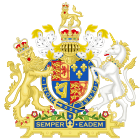Scottish Militia Bill facts for kids
| Act of Parliament | |

|
|
| Long title | A Bill for settling the Militia of that Part of Great Britain called Scotland |
|---|---|
|
Status: Not passed
|
|
The Scottish Militia Bill 1708 was a proposed law in Great Britain. It was approved by both the House of Commons and the House of Lords in early 1708. However, Queen Anne did not sign it into law. She refused to give her royal approval, known as royal assent, on March 11, 1708.
Her advisors told her not to approve the bill. They worried that the new Scottish militia (a group of citizens trained as soldiers) might not be loyal. This concern grew because a French invasion fleet, carrying supporters of the Jacobite cause, was suddenly heading towards Scotland. This event made the Queen's ministers change their minds at the last minute. The Scottish Militia Bill 1708 is famous because it was the last time a British monarch refused to sign a bill into law.
What the Bill Was About
The full name of the bill was "An Act for settling the Militia of that Part of Great Britain called Scotland." Its main goal was to create and arm a militia in Scotland. Scotland had not had its own militia since the time of the Restoration.
This bill came after Scotland and England had joined together to form Great Britain. This union happened with the Acts of Union 1707. The new country needed to decide how to organize its defenses.
On the very day the Queen was supposed to sign the bill, news arrived. A French fleet was sailing towards Scotland. This was part of a planned invasion in 1708. There were strong suspicions that some Scots might not be loyal to the new British government. Because of this, many people supported the Queen's decision to refuse the bill. So, Queen Anne did not give her royal assent.
Why This Bill Was Important
The Scottish Militia Bill 1708 is very important in British history. It was the last time a monarch refused to sign a bill passed by Parliament. Before this, King William III had refused to sign bills six times.
Over time, royal assent became more of a tradition. It was expected that the monarch would approve bills once Parliament had passed them. Since 1708, no British monarch has used their power to veto a law. This makes the Scottish Militia Bill a unique moment in history.
 | Kyle Baker |
 | Joseph Yoakum |
 | Laura Wheeler Waring |
 | Henry Ossawa Tanner |

